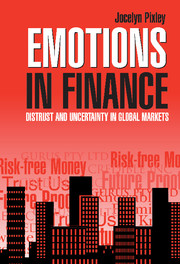Book contents
- Frontmatter
- Dedication
- Contents
- Figures
- Interviews 2000–2002
- Preface
- Abbreviations
- 1 Global Markets or Social Relations of Money
- 2 Emotion in the Kingdom of Rationality
- 3 The Financial Media as Institutional Trust Agencies
- 4 Emotions in the Boardroom
- 5 Credibility and Confidence in the Central Banks
- 6 Hierarchies of Trust
- 7 Overwhelmed by Numbers
- 8 The Time Utopia in Finance
- 9 Implications: Emotions and Rationality
- References
- Index
7 - Overwhelmed by Numbers
Published online by Cambridge University Press: 05 July 2014
- Frontmatter
- Dedication
- Contents
- Figures
- Interviews 2000–2002
- Preface
- Abbreviations
- 1 Global Markets or Social Relations of Money
- 2 Emotion in the Kingdom of Rationality
- 3 The Financial Media as Institutional Trust Agencies
- 4 Emotions in the Boardroom
- 5 Credibility and Confidence in the Central Banks
- 6 Hierarchies of Trust
- 7 Overwhelmed by Numbers
- 8 The Time Utopia in Finance
- 9 Implications: Emotions and Rationality
- References
- Index
Summary
Financial organisations are completely reliant on past data; although no assessment can be anything but retrospective, this has not diminished the sector's trust in numbers and the repression of uncertainty through redefinition. This chapter is about the trust – in risk and hopes for predictability – placed in accountancy and insurance firms, banks and credit-raters, and in forecasting and confidence survey data.
THE PERFECT CALCULATING MACHINE: THE FIRM
Why is information so important? Or, in other words, what does information mean here? A very prominent orthodox theory of the firm puts information at the heart of all corporate activities except, strangely, in the financial sector. In this theory, luck and trust are ruled out as firms use information with ‘guile’. For several decades, Oliver Williamson dominated neo-classical economics by conceding (three centuries on) the existence of the capitalist institution – namely ‘firms’. Firms must imply more than the independent, opportunistic agents of classical economics, whose economic activity is coordinated through market price signals. (The ‘firm’ is a word Williamson uses interchangeably with ‘hierarchies’, in a simple contrast with ‘markets’.) Since firms do exist, this success story is, allegedly, because they can minimise the transaction costs of market exchanges. Williamson construes the origins and functions of ‘opportunistic firms’ as the answer to the ‘hazards’ created from and by opportunistic individuals. (I might note, in passing here, that these individuals sound very like those untrustworthy agents we saw in Chapter 2.)Market failures from hazards and externalities like ‘information asymmetries, uncertainty, incomplete contracting … have transaction cost origins’ which hierarchies (firms) can overcome (Williamson 1991a: 4). Uncertainty is mainly an issue because all agents behave opportunistically at all times, with guile.
- Type
- Chapter
- Information
- Emotions in FinanceDistrust and Uncertainty in Global Markets, pp. 133 - 156Publisher: Cambridge University PressPrint publication year: 2004

